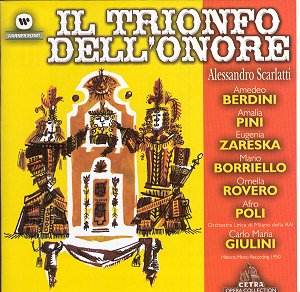My acquaintance with Alessandro Scarlatti, the
father of Domenico, has so far been with church music or spectacularly
beautiful solo or duet secular cantatas. I had thought he was
too dignified to get involved in this trashy form of the Italian
intermezzo. But here he appears in company with the also very
dignified Carlo Maria Giulini and the equally respectable Cetra
record label, so it looks like we should pay attention.
The recording dates from 1950 and is well restored,
obviously from disks. There is some shattering on just a few of
the loud high notes, but most of the time the sound is clear,
comfortable and relatively undistorted. The background is completely
quiet which results in some deadening of the acoustic, but there
is none of the catch-in-the-throat feeling of severe noise clamping.
The voices are very close, yet the orchestra is easily heard.
You had better know Italian pretty well to appreciate
this recording. Not only is there no English text (although with
a story this silly who needs one?) but you will need an Italian
dictionary and some familiarity with that language to repair the
English ‘translation’ of the notes. But you don’t really need
the printed Italian text as the voices are very close up and the
diction is excellent.
A very brief summary of the plot: Leonora said
that awful word ‘marriage’ so her boyfriend Riccardo has fled
the city to his uncle’s country mansion. Eventually everybody
in town shows up there and runs around frantically trying to get
in each others pants. Leonora’s brother Erminio challenges Riccardo
to a duel for dishonouring his sister. Riccardo is wounded, and
swears he really will marry Leonora, whereupon everybody else
on stage, chastened by his example, pairs off and swears they’ll
all get married, too. ‘Il Trionfo dell’Onore.’ Sure they will.
Curtain.
The overture has some of the greatness of Scarlatti
in it. The first act is pretty buffo with the old man singing
in falsetto while he chases after his chambermaid, and everybody
else digging deep into silly lovers’ intrigues. The music rises
dramatically in quality with the second act finale quartet, and
Leonora’s aria opening act three. From here to the end Scarlatti’s
genius for beautiful vocal lines is evident.
The performance includes a harpsichord you can
barely hear, but is definitely politically incorrect, reflecting,
to quote the notes, ‘ideas current in Italy in 1941 about 18th
century opera.’ No original instruments or original performance
practice here, instead we get throbbing violins and luscious phrasing.
Everything is the better for it.
Paul Shoemaker
